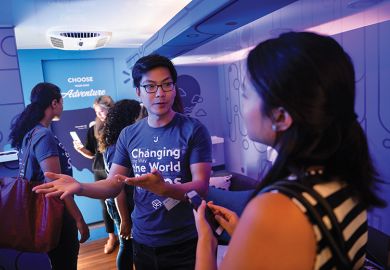Despite universities’ emphasis on the employability benefits of students’ international experiences, it comes low down the list of priorities for recruiters, according to the latest edition of a global survey.
Thousands of companies that took part in the 2021 Global University Employability Survey put internationalisation at the bottom of the list of factors determining which institutions they considered to be producing the most employable graduates.
International skills and experience also scored only 6.4 out of 10 on average when employers were asked how important they were for employability, with firms based in some developed economies such as Australia (5.7), Germany (5.7) and Canada (5.8) rating them even less important.
Laurent Dupasquier, associate director of Emerging, the Paris-based consultancy that runs the annual survey – whose results also inform the Global University Employability Ranking – said a breakdown of the results suggested that employers had different views depending on the “format” of internationalisation.
For instance, professional experience gained abroad – such as an internship – was viewed most positively, while degrees obtained by spending time across campuses in different countries was seen as least useful.
“As far as employers are concerned, internationalism is good,” but recruiters did not see many popular strands of internationalisation “as the best way to acquire” skills they valued, such as teamwork or managing multinational teams.
Such a view could become more influential on student choices in the future, Mr Dupasquier said, especially because the pandemic could increase cost concerns about where to study.
“Maybe you will spend less time in different schools around the world, but that doesn’t mean you spend less time acquiring the skills that internationalisation brings,” he said.
Uwe Brandenburg, managing director of the Global Impact Institute, which specialises in assessing the impact of internationalisation, said that although employers might not identify international experience as something they explicitly sought, there was evidence that it could enhance the personality traits that made people more employable.
He said his own work assessing the impact of the European Union’s Erasmus+ programme suggested that although not “everybody becomes more open, more curious” as a result of studying abroad, a “lot of people do, and statistically significantly so”.
“So you don’t have to convince employers to value international experience when selecting students; you have to show the students that they have a much higher likelihood…to be selected through mobility because it boosts…their abilities,” Dr Brandenberg said.
The Massachusetts Institute of Technology topped Emerging’s Global University Employability Ranking this year, taking the top spot from the California Institute of Technology.
Global University Employability Ranking 2021 (see here for full ranking)
| Global University Employability Rank 2021 | Global University Employability Rank 2020 | University | Country |
| 1 | 2 | Massachusetts Institute of Technology | US |
| 2 | 1 | California Institute of Technology | US |
| 3 | 3 | Harvard University | US |
| 4 | 4 | University of Cambridge | UK |
| 5 | 7 | Stanford University | US |
| 6 | 6 | The University of Tokyo | Japan |
| 7 | 10 | Yale University | US |
| 8 | 5 | University of Oxford | UK |
| 9 | 9 | National University of Singapore | Singapore |
| 10 | 14 | Princeton University | US |
Source: Global University Employability Ranking © Emerging
POSTSCRIPT:
Print headline:Overseas study ‘not a priority’ for recruiters
Register to continue
Why register?
- Registration is free and only takes a moment
- Once registered, you can read 3 articles a month
- Sign up for our newsletter
Subscribe
Or subscribe for unlimited access to:
- Unlimited access to news, views, insights & reviews
- Digital editions
- Digital access to THE’s university and college rankings analysis
Already registered or a current subscriber?




